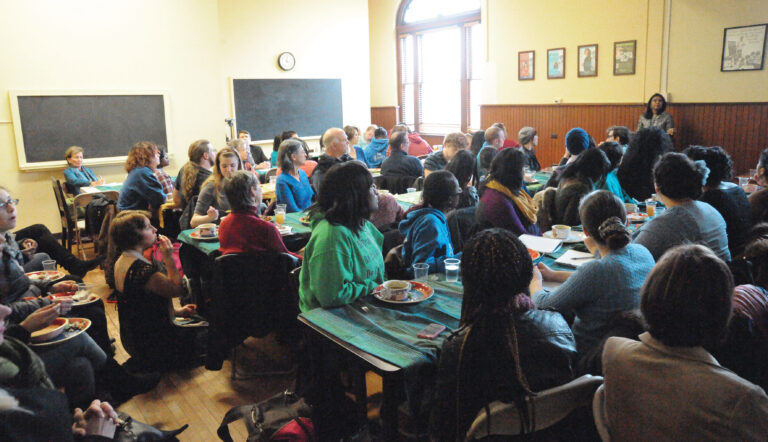Rangita de Silva de Alwis presents at Peanut Butter and Gender
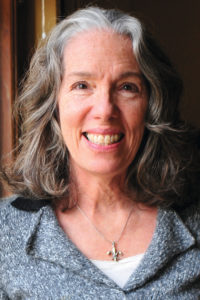
Janice D’Souza, ’14, a native of India, was supposed to marry very young and forgo the possibility of a college education. Instead, she came to Berea College and found herself writing policy briefs and delivering speeches alongside an unlikely collection of young women from around the world.
A Rwandan refugee. An Afghan witness to gender-based violence justified by Sharia law. A mother of three, equipped and ready to picket, marching for social justice stateside.
In all, 22 women from markedly different backgrounds and with markedly specific plans for the future came together for a one-of-a-kind course titled “Empowering Women for Global Leadership.” Spring 2014 was the first semester the course was offered at Berea; in fact, it was the first semester the course was offered anywhere.
The course (WGS/POL/PSJ 286) is the latest extension of the Women in Public Service Project (WPSP), an initiative founded in 2011 by then US Secretary of State Hillary Clinton as a partnership between the US State Department and the Seven Sisters Colleges, comprised of Barnard, Bryn Mawr, Mount Holyoke, Smith, and Wellesley. Berea College joined the partnership in 2014.
The mission is to empower the next generation of women around the world and mobilize them on issues of critical importance in public service. More ambitious and specific, the mission of the project is to achieve for women 50 percent representation in public service positions around the world by 2050, an initiative they call “50 by 50.”
Such empowerment, naturally, begins by equipping women leaders not only with knowledge, but with know-how. Dr. Peggy Rivage-Seul, director of the Berea College Women in Public Service Project and co-architect of WGS 286, pushed her young pioneers to acquire the practical skills for effecting change. Course requirements included a ten-minute delivered speech to develop the power of each student’s voice and a formal policy brief on an issue of social importance.
Dr. Rivage-Seul developed the course alongside Dr. Rangita de Silva de Alwis, when she served as the Director of the Global Women’s Leadership Initiative and the Women in Public Service Project at the Woodrow Wilson International Center for Scholars in Washington, DC.
Representing eleven countries, Berea students tackled subjects like family leave policy in the US, sexual violence in the Congo, gender violence in Bangladeshi garment industries, and female genital mutilation in Tanzania, among others.
“Several of these students are survivors of human rights violations in their own countries. After taking a global look at gender violence, these students were inspired to work to change the conditions of violence—from female rape in the Democratic Republic of Congo to the Taliban in Afghanistan to the border areas throughout Africa to the prison pipeline for African Americans,” said Dr. Rivage-Seul.
Though the issues facing women on a global scale vary in nature, complexity, and intensity, Dr. Rivage-Seul says Berea’s multicultural students are finding a common bond in the course.
“Violence and poverty are social realities that bind women together. While there are laws created in each country to protect women, the implementation of these laws are the problem. Our students are not (yet) lawyers who can take on the legal systems in their respective countries, but they can begin to influence policy and implementation of laws by introducing projects that lead to cultural change.”
The uniting thread between Berea College and Woodrow Wilson is the project’s benefactor, Peggy Keon, former president of career consultation service Keon Associates, and overseer for Wellesley Centers for Women at Wellesley College. Keon invited Dr. de Silva de Alwis to Berea’s Peanut Butter and Gender series, a regular luncheon lecture series focused on issues of gender and culture. From there, the partnership between Berea and Woodrow Wilson was born.
“Peggy Keon is the visionary who saw the powerful potential of Berea to partner with WPSP so as to build a global platform at the college,” said de Silva de Alwis.
Dr. de Silva de Alwis, a human rights lawyer who recently participated in the writing of Tunisia’s new constitution, organized the first WPSP institute at Wellesley College in 2012. Women in Public Service Project institutes, which take place in various global venues, serve as intensive seminars for emerging women leaders in different fields of public service.
The most recent institute was held in Beijing, China. Berea College President Lyle Roelofs joined other WPSP institutional presidents in a roundtable discussion of the 50-by-50 initiative hosted by the Ford Foundation at the China Women’s University, part of the WPSP network.
President Roelofs added that the involvement of important female non-academics like Clinton, former Egyptian ambassador to South Africa Moushira Kattab, and Susan Jolly of the Ford Foundation, among others, has the potential to add many opportunities for Berea faculty and students. For example, in March of 2015 at the invitation of the organization UN Women, which is dedicated to gender equality and the empowerment of women, WPSP students will travel to the United Nations to participate in an intergenerational dialogue, as part of the celebration of the twentieth anniversary of the Beijing World Conference of Women.
Though Berea College will no longer be associated with the Woodrow Wilson Center and the Women in Public Service Project after the fall of 2015, the work will go forward. For example, the Women’s and Gender Studies Program will be the site of the “Women in Global Leadership Project.” Dr. Rivage-Seul says, “The Women in Public Service Project has recently changed to an online service for educational institutions. At Berea College, we made the decision to go forward with the model we created with Dr. de Silva de Alwis. We have developed a powerful network of public service professionals who are thrilled to continue working with our Berea students. Thanks to Peggy Keon’s generous commitment to building an international emphasis in the Women’s and Gender Studies Program, we will continue to offer the course under a new title,” Women in Global Leadership.”
President Roelofs says the Women in Global Leadership course will be a welcome addition to the Berea curriculum because of the college’s educational goal of equipping Berea students for civic leadership.
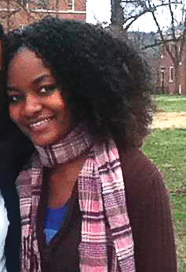
“Berea continues to blaze a trail through its partnership with WPSP,” said de Silva de Alwis, “and President Roelofs is a male champion of change who supports the leadership of women in STEM [science, technology, engineering, and math] and in global public service.”[/text_output][text_output]
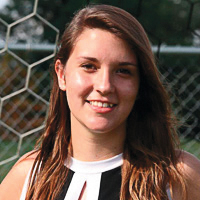
Having lived as a refugee, this Rwandan native knows a thing or two about the challenges refugees face around the world. The Women in Public Service Project at Berea helped her realize she has a role to play in making things better. “The Women in Public Service class has helped me find my passion,” said Nadine. “After graduating, I’d like to go into a master’s program in public policy and afterwards work with a refugee organization.”[/text_output][text_output]
Brenna began activism at a young age, focusing on water pollution. More recently, she shifted her focus to advocating for more stringent policy regarding direct-to-consumer pharmaceutical advertising. “The course gave me the research skills I needed to take on a project like that. It prepared me to challenge myself and tap into my own leadership ability.”
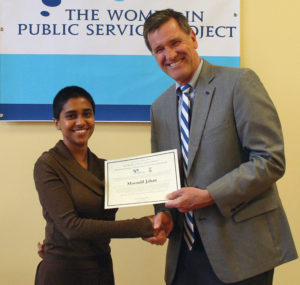
Horrified by the government failure to fund rescue operations after a recent garment factory disaster in her home country of Bangladesh, Moondil banded together with Bangladeshis studying abroad to send money home so operations could continue. The Women in Public Service Project course equipped Moondil with the skills needed to address important issues like this that affect women disproportionately. When the course began, she says, “We didn’t even know what a policy brief was.” But dealing with issues close to home inspired passion. “When you genuinely care about issues you don’t really count the number of hours you are investing in this work, how many times you revise the paper, or time


